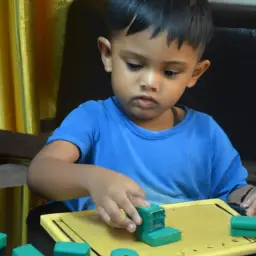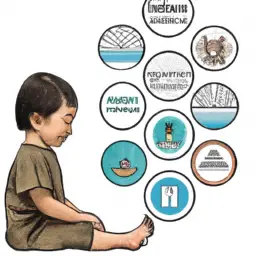Do you ever feel like giving up when faced with challenges? It’s easy to get discouraged when things don’t go according to plan, but perseverance can make all the difference in achieving personal growth.
By developing grit and practicing effective time management, you can overcome obstacles and reach your goals.
Perseverance is the key to success in any area of life, whether it’s academic, professional, or personal. It means sticking with something even when it’s difficult, and not giving up in the face of adversity.
With determination and focus, you can push through challenges and come out stronger on the other side. By incorporating effective time management skills, you can make the most of your time and achieve even more than you thought possible.
In this article, we’ll explore how grit and time management impact personal development, and how you can apply these principles to your own life.
Key Takeaways
- Perseverance and resilience are essential for personal development, and failure should be seen as an opportunity for growth.
- Effective time management is key to achieving personal development, including creating a to-do list, breaking down larger tasks, and balancing work and personal commitments.
- Self-reflection and self-awareness are crucial for personal growth, including prioritizing self-care, recognizing strengths and weaknesses, and understanding how actions impact others.
- Resources for personal development, including mentors, coaches, and like-minded individuals, can provide guidance, motivation, and accountability. Fostering a positive mindset and staying motivated through self-care, inspiration, and curiosity are also important factors.
Understanding the Importance of Perseverance
Don’t give up now, because understanding the importance of perseverance will help you reach your goals and make your dreams a reality. Perseverance is the key to success, and without it, you’ll find it challenging to accomplish anything in life.
When you face obstacles, you must learn to keep pushing forward and never give up. By doing so, you’ll develop a sense of resilience that’ll help you overcome any challenge that comes your way.
The benefits of resilience are numerous. When you’re resilient, you’re better able to adapt to change, manage stress, and bounce back from setbacks. Resilience allows you to remain focused on your goals despite the challenges that may arise. It gives you the strength to face adversity head-on and come out victorious.
So, if you want to achieve success in life, you must learn to persevere and develop the resilience necessary to overcome any obstacle that stands in your way.
The Role of Time Management
You can make the most out of your day by prioritizing your tasks and sticking to a schedule. Effective strategies for time management include creating a to-do list, breaking down larger tasks into smaller ones, and using a timer to stay on track.
By organizing your day in this way, you can ensure that you’re not wasting time on unimportant tasks and can focus on what really matters. Furthermore, balancing work life is essential to achieving personal development.
It can be easy to get caught up in work and neglect other areas of your life, such as your relationships and hobbies. By prioritizing your time and setting boundaries, you can ensure that you have a healthy work-life balance. This will not only improve your overall well-being but also make you more productive and focused in all aspects of your life.
Overcoming Obstacles
You may encounter obstacles along your personal development journey, but developing resilience can help you overcome them.
Learning from failure is also important, as it can provide valuable lessons and opportunities for growth.
Don’t be afraid to seek support from others, as having a support system can help you stay motivated and navigate challenges.
Developing Resilience
When facing obstacles, it’s important to remember that building resilience takes time and effort, but with perseverance and effective time management, you can develop the strength to bounce back from any challenge. Building resilience involves developing a mindset and habits that allow you to navigate setbacks and bounce back from difficult situations. It’s not just about being tough or never giving up, but about learning from mistakes and using them as opportunities to grow and improve.
To build resilience, it’s important to focus on developing a growth mindset and positive habits. This means embracing challenges as opportunities to learn, and approaching setbacks as temporary roadblocks that can be overcome with perseverance and determination. By managing your time effectively and prioritizing self-care, you can build the mental and emotional strength needed to weather any storm. Check out the table below for some tips on how to develop resilience and bounce back from setbacks.
| Resilience Strategies | Examples | |||
|---|---|---|---|---|
| Develop a growth mindset | Embrace challenges as opportunities to learn and improve | |||
| Practice self-care | Prioritize rest, exercise, and healthy habits | |||
| Seek support | Connect with friends, family, or a therapist for emotional support | |||
| Reframe negative thoughts | Look for the positive in difficult situations | |||
| Set achievable goals | Break down big goals into small, manageable steps | Practice self-care | Take time for yourself to do things that bring you joy and relaxation |
Learning from Failure
Learning from failure is crucial for growth and success, as it allows you to identify your weaknesses and make improvements for the future. Embracing failure isn’t easy, but it’s necessary for personal development. It requires a shift in mindset from seeing failure as a negative outcome to seeing it as an opportunity for growth.
Building resilience is a key component in this process. It allows you to bounce back from setbacks and keep moving forward. To find lessons in failure, it’s important to reflect on what went wrong and what could have been done differently. This can be a humbling experience, but it’s necessary for growth.
Moving forward, it’s important to apply the lessons learned from failure to future endeavors. This may involve taking calculated risks and being willing to make mistakes to learn and grow. Remember, perseverance pays off, and failure shouldn’t be seen as a roadblock, but rather as a stepping stone towards success.
Seeking Support
You’ve learned that failing is a natural part of the journey towards success. However, picking yourself up and moving forward can feel daunting at times. That’s where seeking support comes in. Finding resources and building a network of people who can offer guidance and encouragement can make all the difference in your personal development.
When it comes to finding resources, there are a variety of options available to you. You can turn to books, articles, podcasts, and online courses to gain new knowledge and perspectives. Additionally, seeking out a mentor or coach can provide invaluable one-on-one guidance. The key is to stay open-minded and willing to learn from others who have experience in areas you want to improve in.
Building a network is another important aspect of seeking support. Surrounding yourself with people who share similar goals and values can create a sense of accountability and motivation. Joining clubs, attending events and networking in your field can help you connect with like-minded individuals. Remember, personal development is not a solo journey. Seeking support from others can help you stay on track towards achieving your goals.
| Finding Resources | Building a Network |
|---|---|
| Turn to books, articles, podcasts, and online courses | Join clubs and attend events |
| Seek out a mentor or coach | Network in your field |
| Be open-minded and willing to learn from others | Surround yourself with like-minded individuals |
| Gain new knowledge and perspectives | Create a sense of accountability and motivation |
Achieving Personal Growth
If you want to achieve personal growth, you need to cultivate self-awareness.
Identify your strengths and weaknesses, and foster a positive mindset.
Knowing yourself and your limitations will help you set realistic goals and work towards them effectively.
A positive mindset will keep you motivated and help you overcome obstacles along the way.
Cultivating Self-Awareness
By being honest with yourself about your strengths and weaknesses, you can cultivate self-awareness and set yourself up for personal growth. Self-reflection is a powerful tool that allows you to gain a deeper understanding of yourself and your actions. It helps you identify patterns of behavior that may be holding you back and allows you to make the necessary changes to improve your life. Mindfulness practices like meditation and journaling can aid in this process by helping you become more aware of your thoughts and feelings.
To better understand how self-awareness can lead to personal growth, let’s take a look at the following table:
| Self-Awareness | Personal Growth |
|---|---|
| Recognizing your strengths and weaknesses | Setting goals and working towards them |
| Being honest with yourself about your flaws | Developing new skills and abilities |
| Understanding how your actions impact others | Building meaningful relationships |
By cultivating self-awareness, you can set yourself up for success in all areas of your life. It allows you to identify areas for improvement and take action towards achieving your goals. In the end, perseverance pays off, and by dedicating time to self-reflection and mindfulness practices, you can achieve personal growth and reach your full potential.
Identifying Strengths and Weaknesses
Identifying your strengths and weaknesses can be a challenging yet essential process for gaining a deeper understanding of yourself and achieving personal growth. Your strengths are the areas where you excel, while your weaknesses are the areas where you need improvement.
Often, people focus solely on their weaknesses and overlook their strengths. However, acknowledging and utilizing your strengths can be just as important as improving your weaknesses.
To identify your strengths and weaknesses, self-reflection exercises can be useful. Write down your skills, talents, and accomplishments, and think about how they’ve helped you in your personal and professional life. On the other hand, identify areas where you struggle or need improvement.
This exercise can help you identify patterns in your behavior and thought processes, leading to a better understanding of yourself. Remember that everyone has strengths and weaknesses, and it’s essential to embrace both to achieve personal growth.
Fostering a Positive Mindset
To foster a positive mindset, you need to focus on the good in every situation and believe in your abilities to overcome challenges. This involves shifting your mindset from a negative to a positive one.
Here are three ways to develop positivity:
-
Practice gratitude: Start each day by writing down three things you’re grateful for. This will help you focus on the good in your life and shift your mindset to a more positive one.
-
Reframe negative thoughts: When you find yourself thinking negatively, try to reframe those thoughts in a positive way. For example, if you’re thinking "I can’t do this,"reframe it to "I may struggle at first, but I can learn and improve."
-
Surround yourself with positivity: Spend time with people who uplift and inspire you. This will help you stay positive and motivated, even when faced with challenges.
Remember, developing a positive mindset takes time and effort, but it’s worth it in the end.
Applying Grit and Time Management in Different Areas of Life
Applying grit and time management consistently across different areas of life can lead to significant personal development and growth. Balancing priorities is a key aspect of time management. It involves identifying what’s most important and dedicating the necessary time and effort to each task.
This means you should make a schedule that includes both work and personal commitments, allowing you to meet deadlines and achieve your goals. Staying motivated is another important factor in personal development. It can be difficult to stay motivated when facing challenges or setbacks, but with grit and determination, it’s possible to overcome these obstacles.
By setting realistic goals and breaking them into smaller, manageable tasks, you can remain focused and motivated. Remember to celebrate your accomplishments along the way, no matter how small they may seem. With perseverance and a positive mindset, you can achieve personal growth and success in all areas of your life.
Continuing the Journey
Let’s keep moving forward on our journey of growth and progress! You’ve already learned how to apply grit and time management in different areas of your life, and now it’s time to continue the journey.
Staying motivated can be challenging, but it’s crucial to keep pushing yourself towards your goals. Remember why you started and what you want to achieve. Use your past successes as fuel to keep going and never give up.
To help you stay motivated and find inspiration, here are some tips:
- Surround yourself with positive people who support and encourage you
- Read books, watch movies, or listen to podcasts that inspire you
- Set achievable goals and celebrate your progress along the way
- Take breaks and practice self-care to avoid burnout
- Stay curious and try new things to keep your mind engaged and stimulated.
By continuing to apply grit and time management, and by staying motivated and finding inspiration, you’ll be well on your way to personal development and success.
Keep pushing forward, and don’t forget to enjoy the journey along the way.
Frequently Asked Questions
What are some specific examples of obstacles that individuals may face in their personal development journey?
As you embark on your personal development journey, you may encounter various obstacles that can hinder your progress. These obstacles can range from lack of motivation, fear of failure, self-doubt, and limited resources.
However, with the right mindset and support system, you can overcome these obstacles and continue to grow. Having a strong support system, whether it’s friends, family, or mentors, can provide encouragement and guidance during challenging times.
It’s important to remember that personal development is a journey, not a destination, and perseverance is key to reaching your goals.
How can individuals balance the demands of time management with the need for rest and self-care?
To balance the demands of time management with the need for rest and self-care, you can start by implementing self-care strategies and time-blocking techniques into your daily routine.
Self-care strategies can include taking breaks throughout the day to recharge, practicing mindfulness and meditation, and engaging in activities that bring you joy and relaxation.
Time-blocking techniques can help you prioritize tasks and ensure that you are dedicating time to both work and self-care. This can involve scheduling specific times for work, exercise, hobbies, and rest.
Remember that taking care of yourself is just as important as achieving your goals, and incorporating these strategies can help you maintain a healthy balance.
Are there any potential downsides to prioritizing perseverance and grit over other aspects of personal development?
If you prioritize perseverance and grit over other aspects of personal development, there are potential drawbacks to consider. While these qualities can help you achieve your goals and succeed in life, they can also lead to burnout and a lack of balance in your life.
It’s important to build balance by taking breaks, practicing self-care, and focusing on other areas of personal growth, such as relationships and hobbies. Additionally, external factors like privilege and systemic barriers can impact your personal development and success.
It’s important to navigate these challenges and seek out support to help you overcome them and achieve your goals in a healthy and sustainable way.
How can individuals identify and address areas where they may be lacking in grit or time management skills?
To identify and address areas where you may be lacking in grit or time management skills, there are a few self-reflection techniques you can try.
First, take some time to evaluate your current habits and routines and see if there are any areas where you can improve. This could include setting specific goals and deadlines, breaking down larger tasks into smaller, more manageable ones, or learning to prioritize your time more effectively.
Additionally, seeking mentorship or guidance from someone who has experience in these areas can be incredibly valuable. Whether it’s a coach, mentor, or trusted friend, having someone to hold you accountable and offer support and guidance can help you stay on track and continue to grow and develop.
How can individuals adapt their approach to perseverance and time management in response to changing life circumstances or goals?
Adapting strategies and overcoming setbacks are key to achieving your goals and managing your time effectively. When circumstances change or you set new goals, it’s important to reassess your approach and make necessary adjustments.
This might involve learning new skills, seeking out support and resources, or simply being more flexible in your approach. Whether you’re facing a challenging work project, a personal setback, or a major life transition, staying focused and resilient is essential.
By staying adaptable and committed to your goals, you can persevere through any challenge and achieve success in your personal and professional life.
Conclusion
Congratulations! You’ve reached the end of this article about how perseverance and time management impact personal development.
You’ve learned that perseverance is crucial in achieving personal growth and that time management plays a vital role in making progress towards your goals.
By overcoming obstacles and staying committed to your goals, you can achieve great things and become the best version of yourself.
Remember to apply the lessons of grit and time management in all areas of your life, whether it’s in your career, relationships, or personal pursuits.
And most importantly, never give up on your dreams because perseverance truly does pay off in the end.
Keep pushing forward and enjoy the journey of self-discovery and personal growth!















































































































